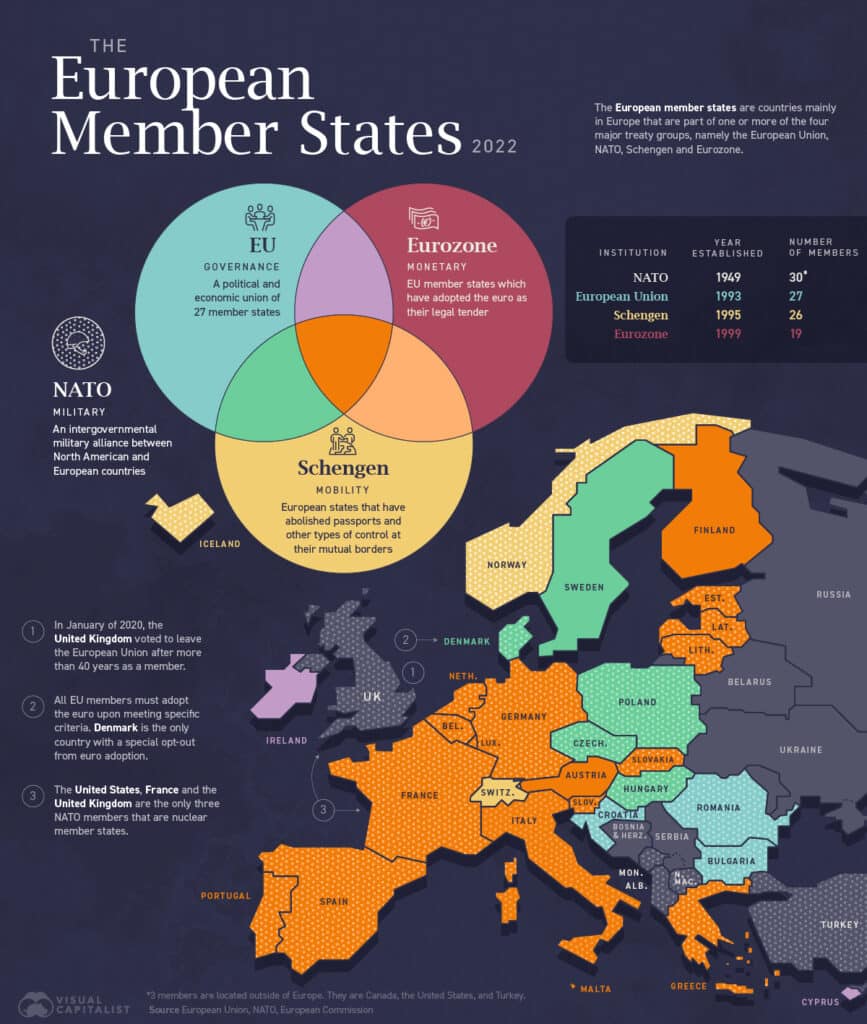It’s time to compare and contrast two crucial concepts: EU permanent residency and citizenship.
If you want to invest as an expat or high-net-worth individual, which is what i specialize in, you can email me (advice@adamfayed.com) or use WhatsApp (+44-7393-450-837).
Introduction
People frequently mix the two, therefore I’m here to clear things up.
In this post, we’ll look at the differences between permanent residency and EU citizenship. We’ll also go through how to obtain each one and why you’d want to.
In brief, the two statuses provide comparable benefits, but there is one big difference.
Difference between EU Permanent Residency and Citizenship
The key distinction between EU permanent residence and citizenship is that only citizenship allows you to apply for a passport.
You have the right to apply for a passport from any EU nation once you become a citizen. You’ll enjoy the same freedom of movement as any other EU person with that passport.
That includes not just tourism, but also the indefinite freedom to live, study, work, and retire anywhere in the Schengen region. All of this can be accomplished with minimum paperwork and bureaucratic red tape.
When you compare that to the lengthy immigration processes that non-EU citizens face, it’s clear how valuable freedom of movement is.
Permanent residency in an EU nation, on the other hand, simply permits you to stay in that country eternally.
Permanent residency does not provide you EU citizenship or indefinite freedom of movement privileges throughout the Schengen region.

The Schengen Area
It is useful to grasp the distinctions between EU permanent residency and citizenship.
Here’s a quick primer.
The Schengen area is comprised of Austria, Belgium, the Czech Republic, Denmark, Estonia, Finland, France, Germany, Greece, Hungary, Iceland, Italy, Latvia, Liechtenstein, Lithuania, Luxembourg, Malta, the Netherlands, Norway, Poland, Portugal, Slovakia, Slovenia, Spain, Sweden, and Switzerland.
Except for Bulgaria, Croatia, Cyprus, Ireland, and Romania, although some of them are in the process of joining, the majority of EU nations are part of the Schengen area.
Iceland, Norway, Switzerland, and Lichtenstein are included in the region, despite the fact that they are not EU members.
This borderless zone ensures free mobility for the EU’s 400 million inhabitants as well as non-EU persons living in the EU, travelling as tourists or on business.
Anyone who is lawfully within the Schengen are has the freedom to travel freely across the Schengen area as a tourist. If you’re a non-EU citizen, this authorization is usually only valid for 90 days out of every 180 days.
After those 90 days have passed, you must leave the Schengen region for another 90 days before returning.
Freedom of Movement in the EU
Although many nations are involved in both, the European Union and the Schengen area are distinct entities.
The European Union is a political and economic union, whereas the Schengen Area provides for free movement of persons between participating nations. The EU is a 27-member political and economic union.
The member states have their own respective governments, but the European Union has shared legislation covering a variety of topics like as commerce, agriculture, and regional development. The EU’s internal single market is tariff-free.
The EU also assures that all EU nationals have free mobility between the EU’s 27 member states. They have the same rights as citizens of their passport nation to live, work, study, and retire in any of the 27 countries. Article 21 of the Treaty on the Functioning of the European Union (TFEU) guarantees this right to free movement.
In contrast, when a third-country national asks for residency in an EU country, they may be refused for a variety of reasons.
How to Obtain EU Permanent Residency
Do you want to have full EU rights? That entails nothing less than an EU passport, with the ability to freely live, work, study, and retire across 27 nations.
That is only possible with EU citizenship, not with permanent residency. Permanent residence, on the other hand, makes sense in some circumstances.
For example, in EU nations where the route to citizenship is lengthier (i.e. more than five years), obtaining permanent residency is a helpful (and often required) step along the process.
The fundamental advantage of permanent residence is that, unlike temporary residency, you do not need to renew your resident permit on a regular basis.
Furthermore, with a few restrictions, you enjoy nearly the same rights as a citizen of the nation as a permanent resident:
- You cannot vote in national elections.
- You are not permitted to serve in the army, join the police or other government services, or even seek political office.
- You do not have the right to freely live, work, study, or retire anywhere in the Schengen region. Only EU citizens have such privilege.
Let’s have a look at how to obtain permanent residency. Please keep in mind that these are only general recommendations. Each EU member state has the authority to establish its own regulations.
Eligibility for EU Permanent Residency
Before you may gain permanent residency in an EU country as a non-EU citizen, you must satisfy a few prerequisites. Typically, these are as follows:
- At least five years of residence in the nation
- Having enough money to maintain oneself and your dependents
- Having a sufficient mastery of the official language
- Having a rudimentary understanding of the country’s way of life
- Evidence that you have enough living space for yourself and your family
You’ll need to apply for permanent residency with the country’s immigration officials.
Start the application procedure as soon as your temporary residency permit is still valid, ideally three to six months before it expires.
But keep in mind that permanent residence does not automatically make you a member of the EU.
We’ll look at how to obtain permanent residency in the EU vs citizenship in the following section.

How to Obtain EU Permanent Residency vs Citizenship
The Holy Grail is EU citizenship. It’s what we strive towards at Digital Émigré, and what we aim to assist you in achieving as well.
Let’s compare the process of obtaining EU permanent residency against citizenship.
To begin, remember that EU citizenship is linked to citizenship in a certain EU nation.
Every country has the authority to establish its own immigration policies. As a result, citizenship processes and criteria vary significantly from one EU nation to the next.
For example, after only five years of (temporary) residency in Portugal, you may be eligible for citizenship. Dual citizenship is permitted in Portugal, therefore you can maintain your original passport.
Spain, on the other hand, demands at least ten years of residency and does not accept dual citizenship.
Furthermore, each country is free to impose its own linguistic standards. Several nations (including Cyprus, Ireland, Malta, and Sweden) allow you to apply for citizenship using solely English.
Only A2 level Portuguese is accepted in Portugal. Others, like Denmark and Germany, are more severe. They want their future population to be able to communicate at an advanced B2 level.
The majority of EU nations lie somewhere in the middle, requiring a B1 language level.
Final Thoughts
Hopefully, you now understand the distinctions between EU permanent residency and citizenship.
The benefits of the two statuses are substantially comparable, but only citizenship grants you the privilege of unrestricted movement throughout the EU and EEA.
Pained by financial indecision? Want to invest with Adam?

Adam is an internationally recognised author on financial matters with over 830million answer views on Quora, a widely sold book on Amazon, and a contributor on Forbes.



